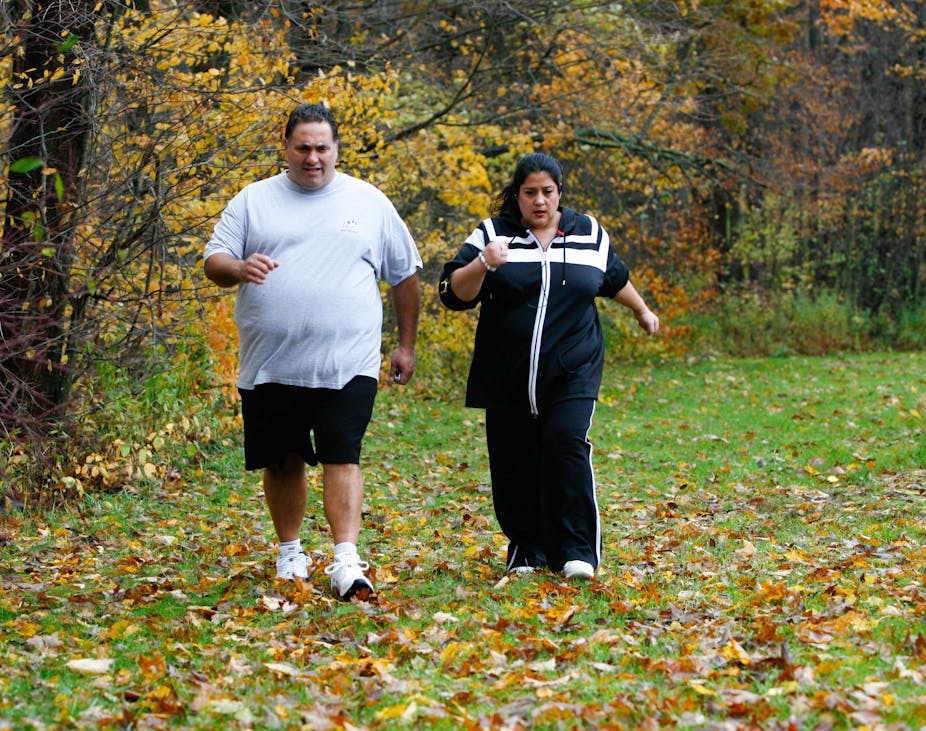For anyone having doubts about overweight or obese people feeling blamed and shamed, the comments on a recent article about a positive image library should settle the matter. They clearly illustrate the assumption that obesity and associated conditions are the fault of the individual, the result of a personal failure to be fit and healthy – they are not.
Eating healthy food and being physically active are important habits, but emphasising only the causal role of individual behaviour for preventing and managing obesity is overly simplistic and misleading. The underlying assumption here is that prevention of lifestyle diseases is completely within the control of the individual.
Contrary to what many people think, there’s a significant body of evidence showing that obesity is much more complex than the equation of calories in and calories out. This was highlighted by a recent series in journal The Lancet. It’s now apparent, for instance, that there’s a strong genetic basis to obesity, a factor that is obviously outside individual control.
What’s more, environmental features make maintaining a healthy diet and being physically active very difficult. An abundance of cheap fast-food options and unrelenting junk food advertising conspire against intentions to only eat healthy food.
Many people have sedentary jobs and rely on cars for transport due to a lack of active transportation options, such as safe and well-lit walking or bicycle paths. And busy lifestyles make it difficult to plan and prepare balanced meals.
Neglecting to acknowledge and address these risk factors, which are outside individual control, leads to a number of unintended, negative consequences. One particularly worrying consequence is the social stigma that now surrounds obesity and associated conditions, such as type 2 diabetes. Indeed, the creators of the positive image library of obese and overweight people were responding to these very prejudices.
Health-related social stigma
Physical and medical conditions, including leprosy, HIV/AIDS, and mental illnesses, have a history of being stigmatised. Some of these persist, and more recently, obesity has joined this list.
Overweight and obese people are thought to be at fault and are blamed for their health challenges, resulting in negative stereotypes and labels, such as lazy, greedy, and undisciplined, which are at once de-motivating and stigmatising.
A systematic literature review indicates the consequences of this social stigma are far-reaching. Weight-related bias is evident in employment, health-care, and familial and romantic relationship contexts. Negative emotional and psychological consequences include loneliness, embarrassment, and depression and anxiety.
Add type 2 diabetes to the mix and the associated stigma becomes even more complex. Type 2 diabetes treatments often induce further weight gain. The condition also requires daily self-management, including dietary adjustments, taking tablets, or injecting insulin. Many of these activities need to take place in public during the course of the day to optimise blood glucose levels.
But the fear of being judged, blamed or misunderstood, sometimes leads people with type 2 diabetes to conceal their condition. The result: omissions of crucial self-management activities, and sub-optimal biomedical outcomes; high or low blood glucose levels in the short term and; complications (such as micro- and macro-vascular disease leading to stroke, impaired vision, or foot problems) in the long term.
In actual fact, type 2 diabetes can be prevented in only around ⅔ of cases. So, blame-driven explanations of the condition reflect the gross misconceptions in society.
Reducing stigma
The widespread, negative social judgements of obesity and related conditions will be difficult to change but here are some ways to start:
1. More comprehensive health promotion messages
Health promotion messages focussing solely on individual behavioural change contribute to and reinforce assumptions that individuals are to blame. We need more comprehensive messages to educate society about how our physical environment and other social, economic, cultural, and genetic factors contribute to obesity and type 2 diabetes.
2. Stigma-sensitive health care
Health professionals have an ethical responsibility to minimise health-related stigma. They should demonstrate an awareness of negative stereotypes and actively work against them. One way of doing this is by not (unintentionally) casting blame on patients for not trying hard enough if their weight-loss efforts are not immediately successful.
People who are actively trying to manage their health can be empowered by becoming involved in organisations aiming to have a positive impact on our food and activity environments. Health professionals might consider referring patients to such organisations as Parents’ Jury and Victoria Walks.
3. Speaking out
Open discussion of the social stigma surrounding overweight, obesity and type 2 diabetes in a forum such as this one is important. Opinion leaders, health professionals, and people who are overweight, obese, or living with type 2 diabetes should be encouraged to engage in conversations in the public arena. They should seek to dispel myths that lead to blame and negative stereotyping.
Researchers also have a role to play. Work exploring the perceptions, experiences, and consequences of health-related stigma from the perspective of the targeted group is one way to have their voices heard. We need systematic exploration of the stigma experienced by people who are overweight or obese.
Improving our understanding
Obesity and type 2 diabetes are both increasing at epidemic proportions. The impact on the healthcare system (in terms of cost, and capacity for service delivery, for instance) is often discussed, but the impact on the individual lives is not.
In Australia alone, there are more than seven million overweight or obese people, and 1.7 million diabetics (around 85% to 90% of whom have type 2 diabetes). So a substantial proportion of our society will experience reduced quantity and quality of life, and is at increased risk of psychological and emotional distress.
It’s crucial to consider the psychological, social, and behavioural predictors of chronic health conditions. But it’s equally important to consider the psychological, social, and behavioural consequences of these conditions.
Better understanding of these issues will lead to better policy and practice. And, ultimately, this means better care and better lives for people who are overweight, obese, or living with associated chronic conditions.

